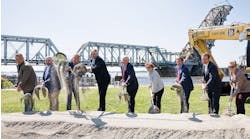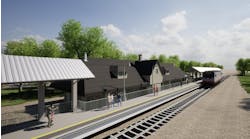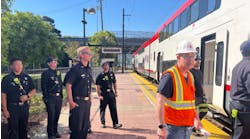A top North Texas transportation official said he supports a regional high-speed rail line that doesn’t run through downtown Dallas — as long as it keeps the project on track.
Moving forward with a new alignment for an estimated $6 billion Dallas to Fort Worth bullet train that loops to the west of downtown could add an extra year to the project’s environmental review phase, said Michael Morris, transportation director of the North Central Texas Council of Governments.
But he said it would be worth it if it gets federal approval and complies with a recent Dallas City Council resolution opposing the seven-story high downtown throughline. Council members are concerned a track cutting across downtown would disrupt plans for a new $3 billion convention center and other multibillion-dollar redevelopment projects near Reunion Tower.
“It is better to get into a potential delay and not have a fatal flaw than to pursue a more expedient path and potentially have a fatal flaw in a Dallas resolution that doesn’t change,” Morris told the Regional Transportation Council on Thursday.
The environmental review for the rail project planned to stop in Dallas, Arlington and Fort Worth began last year and could be complete by February. Funding for the project is still under discussion, and the $6 billion estimate could change after the review.
The transportation council, a 45-member group of North Texas elected and appointed officials that oversees regional transit policies and planning, could vote as soon as August on whether to greenlight the new route.
But several hurdles need to be cleared first.
Morris said the newest proposal must receive initial approval from the Texas Department of Transportation, the city of Dallas, Amtrak, the Federal Transit Administration, the Federal Railroad Administration and other involved entities.
Five Dallas City Council members who serve on the transportation council said Thursday they wanted to wait until a study examining the project’s economic impact is completed before the city reconsiders its stance.
The study, which would include Arlington and Fort Worth, could start in the fall and wrap up in the spring.
“This by no means is trying to say that if Dallas doesn’t get our way, we’re not going to be participating,” said Dallas City Council member Jesse Moreno, whose district includes the Reunion Tower area. “We just want to make sure that it’s not something that’s detrimental to our city core and something that is a big development opportunity.”
The Dallas to Fort Worth high-speed rail line has been touted as a way to lessen highway congestion for the metro area’s 8 million residents. That tally is expected to grow to more than 11 million by 2045. Transportation planners hope the project eventually connects to a separately planned high-speed train linking Dallas to Houston estimated to cost $30 billion.
The Dallas to Fort Worth line is projected to carry 15,000 to 30,000 passengers a day and sprint between the two ends in less than 30 minutes. Another commuter rail line, the Trinity Railway Express, already runs between Dallas and Fort Worth and can take at least an hour to travel between the two cities.
Route alignment proposals presented to the Dallas City Council in March showed the track going from a station in the Cedars just south of downtown and running between the new convention center and a planned $5 billion redevelopment project near Reunion Tower and the Hyatt Regency Hotel.
A different route emailed to the transportation council June 28 moved the track behind the redevelopment project and over Interstate 35E on its way to Arlington and Fort Worth.
The latest map shown to the transportation council Thursday featured the overhead rail line pushed farther west of downtown Dallas and avoiding crossing over I-35E. Instead, the line largely ran parallel to South Riverfront Boulevard, going over several businesses on the west side of the street, a portion of I-30, above a parking lot across from the Dallas County jail and courthouse, and then headed toward Arlington.
Morris said the Dallas resolution knocks out at least three other preferred alignments that cut through downtown but could have provided pedestrian connections from the station to the nearby Eddie Bernice Johnson Union Station and the convention center.
None of the Dallas representatives on the Regional Transportation Council expressed support or opposition to the new route during Thursday’s meeting.
But City Council member Cara Mendelsohn was skeptical either rail project would happen. She cited many unanswered questions, including funding sources for the Dallas-to-Houston line.
“This entire conversation seems extremely premature,” she said.
Morris said he believed high-speed trains were coming to Texas sooner or later and the northern region should be proactive about influencing development.
“To assume high-speed rail may never happen is not a logical step given the growth of Texas and the growth of the Dallas-Fort Worth region,” he said.
A delay in the environmental review could give Arlington more time to secure its spot as the halfway point for the rail line.
The home of Six Flags Over Texas, AT&T Stadium and Globe Life Field, Arlington is one of the largest cities in the country without a public bus or rail system. Morris said Arlington must join a transit authority or a local government authority to be eligible.
“If for whatever reason they can’t, or their voters aren’t interested or their council is not interested, we’re prepared to move ahead with two stations,” he said.
Voters in the city of nearly 400,000 people rejected public transit proposals in 1980, 1995 and 2002.
A Dallas Area Rapid Transit-operated bus route launched in 2013 and was shut down by Arlington officials four years later. The city now has a public rideshare service.
Arlington Mayor Jim Ross said Thursday he believed it would be “ludicrous” to exclude his city from the high-speed rail conversation. He noted Arlington’s hosting of World Cup matches in 2026 and the Major League Baseball All-Star Game and related events starting Friday as examples of the city’s importance to the region.
“I think Arlington has demonstrated our willingness to do what is necessary to stay engaged,” he said.
©2024 The Dallas Morning News. Visit dallasnews.com. Distributed by Tribune Content Agency, LLC.



